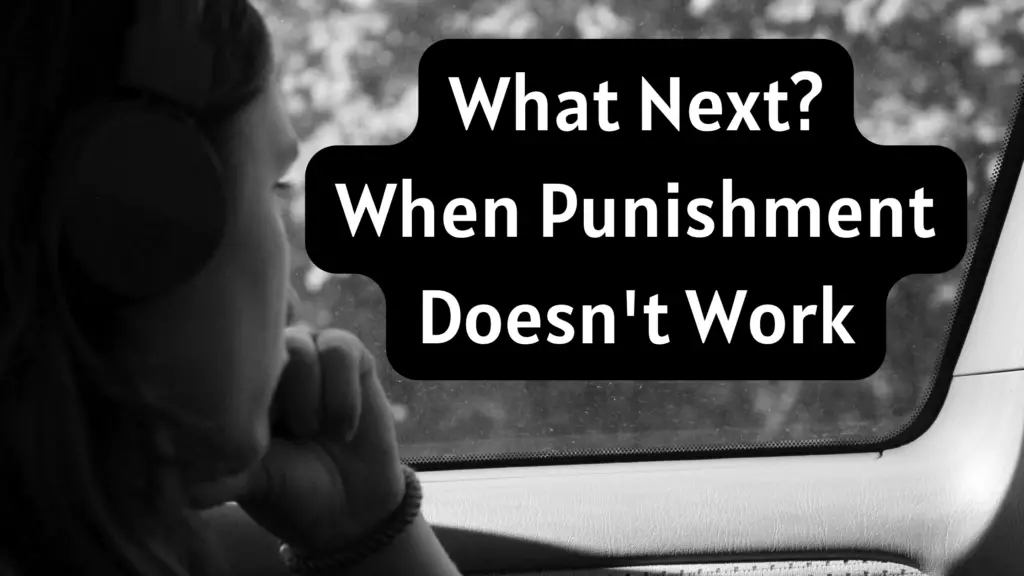We’ve all been there – standing in the midst of a chaotic tantrum or facing a defiant glare from our little ones, wondering why our go-to punishments just aren’t cutting it. It’s time to take a step back and explore what’s going on when our disciplinary efforts seem to fall flat. This means getting the right answer to common question that comes to mind: what to do when punishment doesn’t work?
To get a good understanding on the topic “what to do when punishment doesn’t work”, this will be more of a guide. In it, we’ll dive deep into the reasons why punishment might not be as effective as we hope, and more importantly, we’ll explore alternative approaches that can turn the tide in our favor.
Understanding the Limitations of Punishment
The Short-Term vs. Long-Term Perspective
Punishment is often our immediate reaction to misbehavior, seeking to curb it on the spot. However, while punishments might lead to temporary compliance, they often fail to foster lasting behavioral changes. Imagine this – your child cleans up their room after being grounded, only for the clutter to return once the punishment is over. That’s because punishment alone doesn’t address the underlying reasons for their actions. It’s like applying a band-aid to a wound that needs stitches.
Furthermore, focusing solely on punishment can hinder our child’s understanding of their actions. If we don’t take the time to explain why certain behaviors are undesirable and the consequences they might have, they’re left in the dark, perpetuating a cycle of repeated missteps.
Negative Effects on Parent-Child Relationship
The more we rely on punishment, the more we risk the quality of our parent-child relationship. As punishments pile up, the bond between parent and child can start to fray. Our kids might obey out of fear, but the connection between us diminishes. They might see us as the “enforcer” rather than a loving guide. When they perceive our primary role as one of punishment, they’re less likely to come to us with their struggles and concerns.
Why Doesn’t Punishment Work on Me?
Ever wondered why your child seems to shrug off consequences as if they’re made of Teflon? Well, just like us, kids are unique individuals with their own personalities, motivations, and reactions. Sometimes, they might not respond to punishments due to factors like:
High Temperament
Some kids have naturally strong-willed personalities, and traditional punishments can feel like challenges to them. They might view these consequences as opportunities to assert their independence. Rather than submitting to authority, they might see punishments as a battle of wills.
Lack of Understanding
Younger children might not fully grasp the cause-and-effect relationship between their actions and the punishment. A time-out might simply seem like an arbitrary separation from their activities, leaving them confused about the connection to their behavior.
Emotional Overload
Children, especially those prone to intense emotions, might not be in a mental state to comprehend the consequences of their actions during heated moments. In these situations, punishment might not register as a deterrent – their emotional state trumps logical reasoning.

Exploring Alternatives to Traditional Punishment
Communication and Active Listening
If you are wondering what to do when punishment doesn’t work, then there is an idea you are yet to explore.
Here’s the novel idea – talk to your child like they’re a person with feelings, thoughts, and ideas. Engage in open conversations to uncover the reasons behind their behavior. Maybe they’re acting out because they’re seeking attention or struggling with a problem at school.
Active listening is a superpower when it comes to parenting. It’s not just about hearing the words your child says; it’s about understanding the emotions and motivations underlying those words. When you truly listen, you create a safe space for your child to share their thoughts and feelings, which can lead to more productive discussions.
Setting Clear Expectations and Boundaries
Children thrive on structure, even if they don’t always show it. By involving them in the process of setting rules and boundaries, you empower them to take ownership of their behavior. This collaborative approach helps them understand the “why” behind the rules, making it more likely they’ll abide by them.
This doesn’t mean giving up your authority as a parent; rather, it means involving your child in discussions about rules. When they have a say, they’re more likely to see the rules as fair and reasonable, which can lead to better compliance. It also helps them develop decision-making skills, which are crucial as they grow and encounter more complex situations.
How Do You Discipline a Child That Does Not Respond to Punishment?
You’ve tried timeouts, revoked privileges, and even the stern “no TV for a week” – yet your child’s behavior remains unaffected. What gives? Here’s how to tackle this challenge head-on:
Analyze the Situation
Take a step back and assess whether the punishment aligns with the behavior. Sometimes, our reactions might be overly harsh, or the consequence might not be directly related to the misbehavior. For instance, taking away screen time for a week might not make sense if the misbehavior was unrelated to screen time.
Choose Effective Consequences
If traditional punishments aren’t working, opt for logical consequences that directly relate to the action. For example, if your child refuses to do their homework, consider limiting screen time until they complete their tasks. This not only helps them understand the connection between their actions and the consequences but also provides an opportunity for them to rectify the situation.
Focus on Positive Reinforcement
Punishments focus on what not to do, but positive reinforcement focuses on what to do. Celebrate the victories – no matter how small. Praise your child when they exhibit positive behavior, and offer rewards like extra playtime or a special treat. Positive reinforcement can often motivate better than punishment can deter.
Positive reinforcement works by associating positive outcomes with desired behavior. It creates a sense of accomplishment and encourages your child to continue behaving positively in order to experience those rewards again. It’s a powerful way to shape behavior in a more constructive manner.
Read About: Ways Parents Can Reduce Teenage Lying
Implementing Consequences vs. Punishments
Natural Consequences
Sometimes, allowing your child to experience the natural outcomes of their actions can be a powerful lesson. If they refuse to wear a jacket on a chilly day, they’ll likely feel cold and learn the importance of dressing appropriately. These experiences can provide valuable life lessons that go beyond the immediate situation.
Natural consequences are powerful teachers because they allow children to directly experience the results of their actions. It’s important, however, to ensure that the natural consequences are not dangerous or harmful. For instance, letting a child touch a hot stove to learn that it’s hot would be too risky.
Logical Consequences
Unlike punishments, which might feel arbitrary, logical consequences are directly tied to the misbehavior. If your child repeatedly forgets to pack their lunch, they’ll likely go hungry at school. This way, they understand that their choices have real-world implications. Logical consequences are less about punishment and more about teaching responsibility and accountability.
The key with logical consequences is to ensure they’re related to the behavior and reasonable in nature. They should provide an opportunity for the child to learn from their mistake and make amends. For example, if a child breaks a toy due to rough play, a logical consequence might involve having them contribute to the cost of a replacement using their allowance.

What to Do When Consequences Don’t Work?
So, you’ve tried consequences that seem like they should be effective, but your child remains unmoved. Don’t worry – there’s more to explore:
Reassess Your Approach
Are your consequences consistently applied? Are they proportionate to the behavior? Consistency and fairness are key. If your child senses that consequences are random or that different behaviors result in the same punishment, they’re less likely to take them seriously.
Talk It Out
Have an open conversation with your child about their behavior and the consequences. Understand their perspective, and express your concerns too. This can provide valuable insights and pave the way for understanding. Remember, the goal isn’t just to impose consequences, but to help your child learn and grow from the experience.
Collaborate on Solutions
Involve your child in finding solutions. Ask them what they think could help them remember their chores or complete their homework. When they’re part of the solution, they’re more likely to follow through. This approach empowers them to take responsibility for their actions and actively participate in their own growth.
Collaborating on solutions also shows your child that you value their input and respect their perspective. It encourages critical thinking and problem-solving skills, which are essential life skills that extend far beyond the realm of discipline.
Teaching Emotional Regulation and Problem-Solving
Emotional Intelligence
Children often act out when they don’t know how to handle their emotions. Teach them to recognize and manage their feelings. Create a safe space for them to express themselves, and provide tools like deep breathing or journaling. Emotional intelligence is the foundation for healthy self-expression and coping mechanisms.
Emotional intelligence helps children develop empathy and understand the emotions of others as well. By acknowledging their feelings and providing them with tools to navigate challenging emotions, you’re equipping them with skills that will serve them well throughout their lives.
Problem-Solving Skills
Equip your child with the ability to solve problems constructively. Guide them through brainstorming solutions, weighing pros and cons, and making informed decisions. These skills will serve them well beyond their childhood years. Problem-solving isn’t just about resolving conflicts – it’s about developing a mindset of resilience and adaptability.
Problem-solving skills involve critical thinking, creativity, and decision-making. By involving your child in these processes, you’re fostering their independence and confidence. These skills enable them to approach challenges with a positive attitude, knowing that they have the tools to overcome obstacles.
Read About: How to Discipline a Child That Shuts Down
How Can You Make Punishment More Effective?
Still wondering what to do when punishment doesn’t work? May be it is time to make your punishment techniques more effective.
Punishment isn’t entirely off the table – it just needs a makeover. Here’s how to make it more effective:
Be Swift and Consistent
If you opt for punishment, make sure it’s delivered promptly after the misbehavior. Consistency is key – your child should know what to expect each time they break a rule. If the consequence is delayed or sporadic, it loses its impact and clarity.
Focus on Learning, Not Blame
Position punishment as an opportunity for growth. Explain why their behavior was unacceptable and how they can make better choices next time. Shift the focus from assigning blame to promoting personal responsibility and growth. This reframing encourages your child to view consequences as learning experiences.
Combine with Communication
After the dust settles, have a heart-to-heart conversation. Discuss why their behavior led to the punishment and how they can avoid similar situations in the future. Communication helps bridge the gap between punishment and understanding. It also demonstrates that you’re invested in their development and that you’re there to guide them toward better choices.
Seeking Professional Help
Recognizing When It’s Necessary
Parenting doesn’t come with an instruction manual, and there’s no shame in seeking help when things get tough. If your child’s behavior consistently disrupts their well-being or the family’s harmony, professional guidance might be the way forward. Trust your instincts – if you’re feeling overwhelmed and your usual approaches aren’t yielding results, seeking help is a proactive step.
Consulting Parenting Experts or Therapists
Parenting experts and therapists specialize in understanding child behavior and family dynamics. They can help tailor strategies to your child’s unique needs, offering insights you might not have considered. These professionals can provide a fresh perspective and introduce techniques that align with your child’s personality and challenges.
Conclusion
Parenting is a journey of growth, both for us and our children. Punishment alone rarely gets us where we want to be. By embracing alternatives like open communication, logical consequences, and teaching vital life skills, we lay the foundation for respectful relationships and positive behavior. Remember, it’s never too late to change course and create a more harmonious family dynamic.







